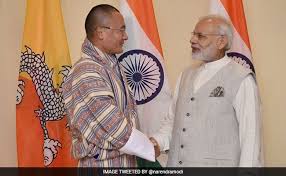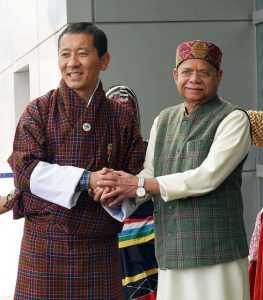
Bhutan’s newly elected Prime Minister Lotay Tshering’s three-day visit to India is set to reaffirm and galvanise all-weather ties between the two neighbours, which remain robust amid geopolitical flux in the region.India has rolled out the red carpet for Bhutan’s prime minister, who touched down in New Delhi on December 27, the last foreign leader to visit the country in 2018. Mr Tshering is being accompanied by Foreign Minister TandiDorji and other officials of the Royal Government of Bhutan.
In statements ahead of the visit, both New Delhi and Thimphu have struck an upbeat note, and underscored exemplary ties between the two countries, which are widely seen as a model of good neighbourliness.“India and Bhutan enjoy exemplary ties of friendship and cooperation, based on utmost trust, goodwill and mutual understanding at all levels,” said India’s external affairs ministry.
“The upcoming visit of the Prime Minister Dr.Lotay Tshering will provide an opportunity to the two sides to review the progress in our multifaceted partnership and to discuss ways and means to expand the enduring ties of friendship and cooperation for the benefit of the two peoples.”“The visit coincides with the Golden Jubilee year of the establishment of formal diplomatic relations between Bhutan and India,” the Ministry of Foreign Affairs of Royal Government of Bhutan said in statement.

Significantly, Dr Tshering’s visit is taking place close on the heels of newly elected Maldivian President Ibrahim Mohamed Solih’s three-day visit to India in the third week of December. Like Maldives, Bhutan, too, has ‘India First’ as its policy. The two visits showcase an upswing in India’s neighbourhood policy against the backdrop of rapid inroads made by a neighbouring country.
At the time when New Delhi and Thimphu are celebrating 50 years of their diplomatic engagement, both countries are set to build on the shining vision expressed by Prime Minister Narendra Modi during his visit to Bhutan in 2014. “Bharat should stand for Bhutan and Bhutan for India,” Prime Minister Modi had said.
What’s on agenda?
Prime Minister Narendra Modi will hold talks with his Bhutanese counterpart in New Delhi on December 28. Bhutan’sprime minister, as per the statement from foreign affairs ministry, will discuss various aspects of bilateral relations, including Bhutan’s 12th Five Year Plan and hydropower cooperation with Indian leaders during his visit.
Under the 11th Five Year Plan, India had committed Rs 4500 crore to Bhutan. Of this total, Rs 2800 crore was provided as Project Ties Assistance(PTA), Rs 850 crore for Small Development Projects(SDP) and Rs 850 crore as Programme Grant/ Development Subsidies. India had also offered Rs 500 crore for the Economic Stimulus Plan of Bhutan.
Cooperation in hydropower sector will figure prominently in the talks. Under their multi-faceted energy partnership, New Delhi and Thimpu are engaged in building a host of hydropower projects. During Tshering’s visit, the two countries are expected to jointly commission the India-assisted 720-MW Mangdechhu hydropower project in Bhutan, the run-of-the river project located on river Mangdechhu in Trongsa Dzongkhag district of Central Bhutan. In April 2010, an agreement for the Mangdechhu hydropower project was signed between the two countries. Under an energy pact, India has agreed to assist Bhutan in developing a minimum of 10,000 MW of hydropower and import the surplus electricity from this to India by 2020. So far India has constructed three hydropower projects in the Himalayan country—336 MW Chukha project, 60MW Kurichhu project and 1020 MW Tala project. All these three are operational and exporting surplus electricity to India.
Strategically placed in the Himalayan region, Bhutan is pivotal for India’s security. The strategic facet of India-Bhutan ties was in focus during the 73-day standoff between India and China over Doklam last year. At the height of tension between India and China over the tri-junction, Thimpu’s statement on the Chinese activity had helped India in presenting a true picture over developments in Doklam before the world.
Chinese army’s attempt to construct “the road inside Bhutanese territory is a direct violation of the 1988 agreements between Bhutan and China and affects the process of demarcating the boundary between the two countries,” a statement released by Bhutan’s foreign affairs ministry said last year.
In consonance with the 2007 India-Bhutan Friendship Treaty, the two countries have agreed to cooperate closely with each other on issues of their national interests. Not only is India responsible for the protection of Bhutan from all kinds of external threat, it is also responsible to offer the Himalayan country’s financial and other necessary humanitarian assistance. Trust and mutual understanding, that have developed between the two countries over the years, will get further strengthened during PM Tshering’s visit.
(Shankar Kumar contributed inputs for this article)
Author Profile
- India Writes Network (www.indiawrites.org) is an emerging think tank and a media-publishing company focused on international affairs & the India Story. Centre for Global India Insights is the research arm of India Writes Network. To subscribe to India and the World, write to editor@indiawrites.org. A venture of TGII Media Private Limited, a leading media, publishing and consultancy company, IWN has carved a niche for balanced and exhaustive reporting and analysis of international affairs. Eminent personalities, politicians, diplomats, authors, strategy gurus and news-makers have contributed to India Writes Network, as also “India and the World,” a magazine focused on global affairs.
Latest entries
 DiplomacyJanuary 5, 2026India walks diplomatic tightrope over US operation in Venezuela
DiplomacyJanuary 5, 2026India walks diplomatic tightrope over US operation in Venezuela India and the WorldNovember 26, 2025G20@20: Africa’s Moment – The Once and Future World Order
India and the WorldNovember 26, 2025G20@20: Africa’s Moment – The Once and Future World Order DiplomacyOctober 4, 2025UNGA Resolution 2758 Must Not Be Distorted, One-China Principle Brooks No Challenge
DiplomacyOctober 4, 2025UNGA Resolution 2758 Must Not Be Distorted, One-China Principle Brooks No Challenge India and the WorldJuly 26, 2025MPs, diplomats laud Operation Sindoor, call for national unity to combat Pakistan-sponsored terror
India and the WorldJuly 26, 2025MPs, diplomats laud Operation Sindoor, call for national unity to combat Pakistan-sponsored terror







